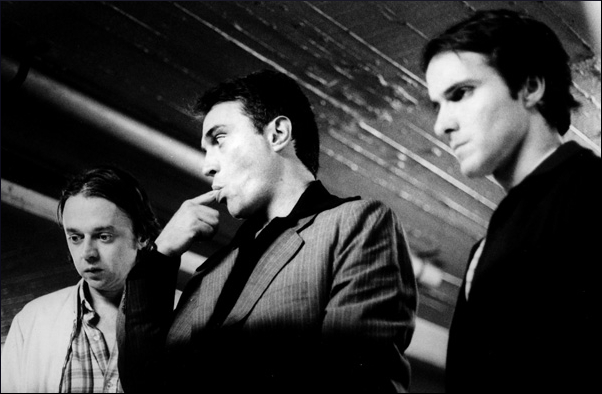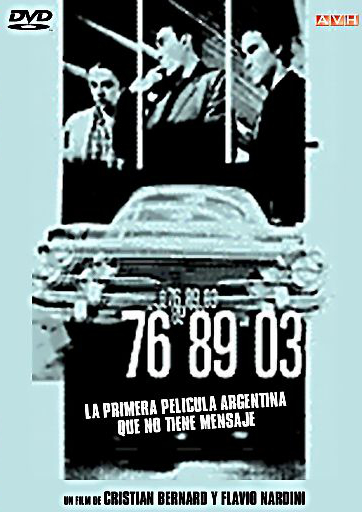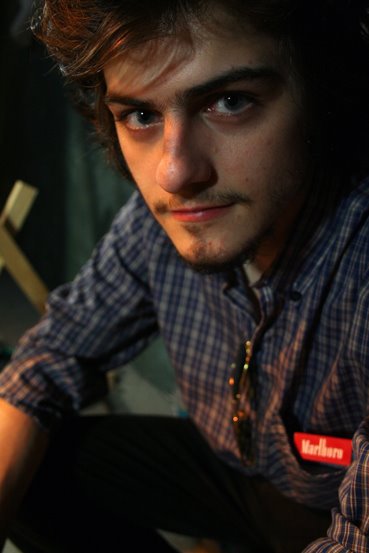It’s not a license plate number: 76 89 03 takes its name from the three years that span the story. It all begins in 1976, the date of the military’s coup d’état. Three young friends are trying to survive elementary school, but their out-of-control pheromones explode when it comes to Wanda Namera, a model who does sexy photo-shoots and spreads for magazines. Years later, in 1989, the three of them are sitting at a bar, drinking and watching the news on television, learning that a sex video with Wanda Namera has surfaced. Paco, one of the friends, is about to get married to a heavyset woman he doesn’t love. Salvador is still a virgin at the age of 25. And Dino, the alpha male of the group, has a plan. He has chanced across a bag filled with cocaine, and with the money he expects to make from it, he wants to hire Wanda Namera’s sexual services. The final scene serves as an epilogue, taking place in 2003, still in the future when the film was shot.
This was the debut of directors Cristian Bernard and Flavio Nardini, who have continued to collaborate on both documentaries and fictional works. 76 89 03 is frequently cited among other movies, like Pizza, Birra, Faso (Pizza, Beer, Joint) and Nueve Reinas (Nine Queens) as an example of the New Argentine Cinema, a movement that spurred a sorely-needed renovation in both themes and style. A number of common flaws that used to surface again and again in Argentine movies – overstatement of themes, extensive and ponderous dialogue, bad sound design, clumsy framing – are nowhere to be found here. The crisp, grainy, black and white cinematography reminds immediately of cinematographer Michael Chapman’s work in Martin Scorsese’s Raging Bull, another (albeit more serious) film about hormones and masculinity. In fact, Scorsese’s masterpiece is overtly referenced by Bernard and Nardini, in a title card, as is Brian De Palma’s Scarface, seen on a television screen. Quentin Tarantino’s trademark trunk shot (that is, a shot looking up at the characters from inside the open trunk of a car) is also cited.
"76 89 03 is frequently cited as an example of the New Argentine Cinema."
What really sets this Argentine movie apart from its influences, as well as its local contemporaries, is its nihilistic and dark sense of humor. The three protagonists recall a specific type of young man from Buenos Aires, chauvinistic and abrasive, essentially dumb and immature. This kind of guy, middle class with a Christian upbringing, might not even have a lot of experience with women, but since he considers them a trophy, he’s always willing to take credit for them as if he were a playboy. Bernard and Nardini are so unapologetic in their representation of this type of character, that their film is sometimes uncomfortable to watch, as the trio behaves in ways that remind us too much of real-life situations.

The directors use the three titular dates cleverly: the protagonists remain fixed in arrested development, as the country changes around them. In 1976, they sit in a classroom as a priest gives them the low-down on the “communist threat” that will presumably take over the world. But they don’t pay attention because their minds are occupied with a magazine featuring Wanda Namera. Similarly, in 1989, Argentina is mired in its greatest recorded inflationary process, as the national currency, the austral, is practically bereft of fixed value as its worth plunges in a matter of hours. But, for the three friends, the only reason any of this screams trouble is that now Wanda Namera will only accept American dollars, “the greens.” The final scene occurs in 2003, and this reflects on both the movie’s actual production date, 2000, and the unpredictability of Argentina. Bernard and Nardini imagine a 2003 in which Carlos Menem’s profitable but corrupt and treacherous economic model has triumphed, and said president is about to be re-elected yet again. While not necessarily a bad forecast, a year after the film’s release, in December of 2001, the economic model instituted by Menem during the 1990s crashed, the country spiraled into chaos, banks stopped returning their clients’ savings, riots erupted everywhere, and then President De la Rúa was forced to flee from his presidential palace on a helicopter.
There is plenty of dialogue in 76 89 03, since most of its running time is made up of banter between the three friends. Yet, unlike most Argentine dramas, in which every character only too quickly verbalizes his or her motivations and hang-ups, words here are both inane and deeply meaningful. When talking about Wanda Namera, Dino says, “Yo no me la llevaría a la cama. Me la cogería en un baño, bien borracho y bien drogado. Y ni siquiera acabaría: le vomitaría encima” (I wouldn’t even take her to bed. I would fuck her in a public toilet, drunk and stoned. And I wouldn’t even finish: I’d just puke on her). In another scene, Dino curses at a thief and calls him a “cabecita negra,” or “little black head,” a racist term that is not aimed at black people (who barely registered as immigrants until only a few years ago) but rather at working class poor people, with a history in the country dating back to the 1940s. To sum up, the characters in 78 89 03 are typical middle class inhabitants of Buenos Aires who throw around “che” a lot. It would be curious to see how one would translate dialogue so populated with local jokes and comparisons, without completely ignoring the original street poetry.



